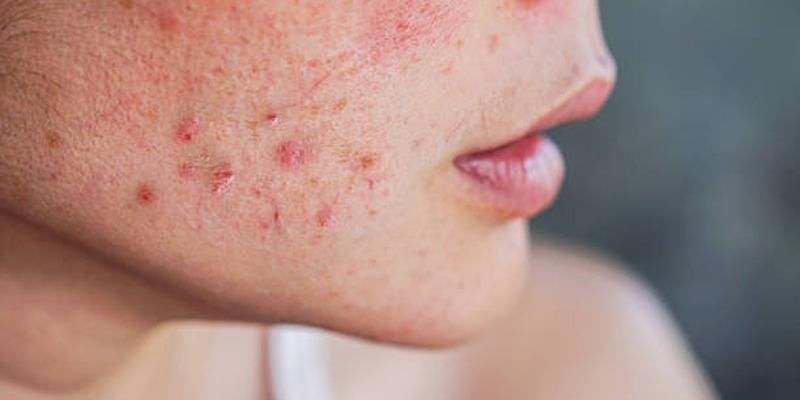Eczema, or atopic dermatitis, is a chronic skin disease that afflicts millions of individuals all across the world. It is traditionally connected to an increased risk of asthma and allergies development, so-called, an atopic march. This guide will refer to how eczema is associated with asthma and allergies, which are the primary risk factors and the practical measures to be considered in order to control the conditions mentioned above.
Eczema is a long-lasting skin condition, and it causes inflammation, redness, itchiness, and lack of moisture. It can begin at childhood but can be associated with people of any age. The worst form of Eczema can also cause thickened, cracked and oozing skin. It is not entirely understood that eczema causes exist but it is believed that it is caused by a combination of genetic, immune and environmental factors.
Persons with eczema often experience a flare up due to irritants like soaps, allergen like pollen, stress or even food. The potential triggers can worsen the symptoms; therefore, individuals should identify their own triggers and avoid them to minimize flare-ups, allowing them to manage the condition at its optimum.

Eczema has been considered as the first step in a cascade of allergic reactions that may lead to asthma or other allergic conditions, in a cascade often referred to as the atopic march. This is the case because eczema, asthma and allergies are characterized by similar dysfunctions of the immune systems. The hyper responsive immune system is eczematous and oversensitive to allergens that have the effect of triggering chronic inflammation of airways and skin.
Research has made it clear that eczematics are more susceptible to contracting asthma. It is associated with too much immune response in the form of Type 2 inflammation, which is contributory to asthma and eczema. Eczema causes inflammation of the skin; therefore, dysregulation of the immune system can extend to the lungs where it is also a contributor to asthma common airway inflammation, swelling, and difficulty in breathing. Studies have shown that children with eczema have a highly increased likelihood of asthma and allergic rhinitis in the future.
Eczema is closely associated with an increase in the frequency of getting allergic to several things. People with eczema are prone to heightened immune response and this can also predispose them to allergic diseases. The eczema has a weakened skin barrier that allows the allergens and irritants to easily get into the skin and this leads to an immune response in such a way that the body becomes sensitive to other substances. This is thought to cause more allergic diseases such as food allergies, hay fever and asthma due to increased sensitivity.
These allergic disorders are more likely to occur with eczema and it is paramount to find out their connection so as to control them. Below are some of the allergies to eczema.
Immunological dysfunction lays the foundation of the relationship between eczema, asthma and allergies. The immune system responds excessively in people with eczema causing chronic inflammation to the skin. This dysregulation is also associated with asthma and allergic reactions, which also entail inflammation, but at a different body location (skin and airways).
The barrier of the skin of the people with eczema is compromised and thus, easily penetrated by the allergens and microbes. This causes the immune system to over react, resulting in inflammation. This decontrolled immune response spreads to the airways in asthma triggering inflammation and airway sensitivity to airborne allergens that make it hard to breathe.
Through this ability to treat this immune dysfunction, eczema and asthma symptoms can be treated more efficiently. An approach to treatment is usually aimed at the decrease of inflammation and enhancement of the immune system.
Eczema, asthma and allergies have a tendency of occurrence in families implying that it is genetic. Eczema is typically linked with mutations in some specific genes, some of which are important to skin protection. This genetic predisposition subjects the skin to irritants and allergens that make the skin susceptible to eczema and other allergic related diseases.
In addition to the role of genetic factors, environmental triggers are also highly vital in the development and worsening of eczema. These include:
Managing eczema effectively requires a multifaceted approach, combining medical interventions with changes in lifestyle and diet. Understanding and addressing the various factors that influence eczema can significantly improve an individual’s quality of life. Below are key strategies for treatment and management:
Topical corticosteroids are frequently used to eczematic patients as part of medical therapy to decrease the inflammation and itching. Besides that, in severe cases doctors can prescribe oral antihistamines or immunosuppressants. Light therapy (phototherapy) is another technique of immunosuppression in case of chronic diseases. It is important to discuss with a dermatologist so that the treatments could be offered based on the requirements of a person.
Changes in lifestyle are a key factor in decreasing the outbreaks of eczema. Frequent application of emollients to the skin precludes skin drying and irritation. Friction on sensitive skin can be minimized by wearing soft breathable clothes. Stress is also to be managed because it can lead to or aggravate symptoms. To help the skin get healthier and reduce the exacerbations, establishing a disease-free environment may be beneficial, as well.
Certain sufferers of eczema discover that there are foods that can increase symptoms. Some people are sensitive to such foods as dairy, nuts, and gluten. The triggers can be identified with the use of elimination diet in order to manage the condition. Anti-inflammatory foods, like fatty fish, leafy greens, and antioxidant-rich fruits could also be beneficial to the skin and well-being.
Asthma and allergies are associated with eczema because of the problems with immunogenesis, heredity and environment. The atopic march explains how eczema may cause these conditions in the long term as the immune dysregulation impacts the body. Treatment of eczema and associated disorders include both medical and nonmedical therapy, and management of stress.
 TOP
TOP
Discover the key differences between Pilates and Yoga to choose the best path for your wellness.
 TOP
TOP
Learn the hidden risks of silent heart disease and how to protect your heart health.
 TOP
TOP
Optimize cycling comfort and performance with expert foot care and proper shoe choices.
 TOP
TOP
Discover the top 5 travel goals to achieve in 2025 and ignite your wanderlust with must-visit destinations and unforgettable experiences worldwide.
 TOP
TOP
Discover Paris beyond the usual landmarks with unique attractions and hidden gems that reveal the city's authentic charm.
 TOP
TOP
Oman’s Grand Canyon, a breathtaking destination offering stunning views, cultural insights, and adventurous hiking trails.
 TOP
TOP
How Macumba blends ancient traditions and innovation at La Route du Rock, offering transformative musical experiences that unite and inspire.
 TOP
TOP
Learn key facts about pediatric craniofacial surgery, common conditions, procedures, recovery, and emotional support that improve children’s health outcomes.
 TOP
TOP
Explore how eczema increases the risk of asthma and allergies, key risk factors, immune dysfunction, and management strategies for better health.
 TOP
TOP
Oman’s breathtaking coastal hiking trails, blending stunning nature and rich culture. Plan your perfect adventure today!
 TOP
TOP
Learn what a promissory note in real estate is, how it works, its importance, and how it differs from a mortgage in detail here
 TOP
TOP
Discover how hormones affect acne, dryness, and skin health, and learn practical tips to restore balance naturally.